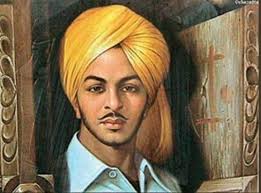
Introduction
Bhagat Singh, one of India’s most celebrated revolutionaries, was not only a fearless freedom fighter but also a thinker and intellectual who developed a unique ideology that blended socialism, anti-colonialism, secularism, and atheism. His commitment to independence was not just about removing British rule but about creating a just and equal society based on socialist principles. His ideas were deeply influenced by Marxist thought, anarchism, and the works of revolutionary leaders worldwide.
Early Influences on Bhagat Singh’s Ideology
Bhagat Singh was born on September 28, 1907, into a politically active family in Punjab. His father and uncles were involved in the freedom struggle, which instilled in him a strong nationalist spirit. He was deeply affected by the Jallianwala Bagh massacre (1919) and the execution of freedom fighter Kartarpur Singh Sarabha, which led him to believe that armed revolution was necessary to overthrow British rule.
As a student at National College, Lahore, he was exposed to the ideas of Karl Marx, Friedrich Engels, and Vladimir Lenin. He studied the Russian and Irish revolutions, drawing inspiration from their strategies for independence and social justice.
Core Elements of Bhagat Singh’s Ideology
1. Socialism and Economic Justice
Bhagat Singh was a staunch believer in socialism. He argued that political freedom from British rule alone was not enough—true freedom meant economic and social equality for all. He believed that capitalism and feudalism were just as oppressive as colonialism and that India should strive to build a society where resources were equally distributed.
In his essay “Why I am an Atheist”, he criticized the idea that divine intervention would solve India’s problems and emphasized that revolutionaries should work towards a society based on scientific and rational principles.
His association with the Hindustan Socialist Republican Association (HSRA) was an extension of his socialist beliefs. HSRA aimed to replace the British regime with a socialist republic where wealth was distributed among all citizens rather than concentrated in the hands of a few.
2. Anti-Colonialism and Armed Struggle
Bhagat Singh rejected Mahatma Gandhi’s philosophy of non-violence, arguing that passive resistance alone would not be sufficient to overthrow the British. He believed that revolutionary violence was necessary to awaken the masses and challenge British oppression.
His most famous act of defiance was the killing of John Saunders in 1928, which was meant as revenge for the brutal lathi charge that led to the death of Lala Lajpat Rai. He also played a key role in the 1929 Central Assembly Bombing, where he and Batukeshwar Dutt threw non-lethal bombs and distributed pamphlets advocating for revolution.
However, Bhagat Singh’s concept of revolution was not about meaningless violence but about inspiring the masses to rise against their oppressors. He famously wrote:
“It is not the cult of the bomb and the pistol. The revolution is against injustice, tyranny, and exploitation.”
3. Atheism and Rationalism
One of the most defining aspects of Bhagat Singh’s ideology was his atheism. In “Why I am an Atheist”, he argued that religious beliefs often blinded people from taking action against injustice. He criticized the reliance on divine intervention, asserting that rational thought and human effort were the only means to achieve true freedom and social progress.
Bhagat Singh’s atheism was also tied to his rejection of communalism. He was strongly against the Hindu-Muslim divide, which the British exploited to weaken India’s freedom movement. He envisioned an India where people of all religions could coexist peacefully without discrimination.
4. Nationalism and Secularism
Bhagat Singh was deeply nationalist but opposed narrow religious nationalism. Unlike many leaders of his time who sought a free India based on religious or cultural identity, Bhagat Singh envisioned a secular nation where all citizens, regardless of religion, would have equal rights.
His secular vision can be seen in the activities of Naujawan Bharat Sabha, an organization he founded to encourage young Indians to fight for independence without religious or caste-based divisions.
5. Revolutionary Literature and Intellectual Contributions
Bhagat Singh was not just a fighter; he was also a prolific writer and thinker. He wrote extensively on topics such as:
- The importance of youth in revolution
- The necessity of scientific thinking
- The failures of Gandhian non-violence
His writings, such as “The Philosophy of the Bomb” and “Why I am an Atheist,” continue to inspire generations of revolutionaries and activists. He used literature as a tool to educate and mobilize people towards the cause of socialism and independence.
Bhagat Singh’s Legacy
Although he was executed at the young age of 23 on March 23, 1931, Bhagat Singh’s ideology continued to influence future generations of political activists, leftist movements, and socialist parties in India.
His belief in socialism influenced post-independence leaders who worked towards social justice and economic equality. His vision of secularism remains relevant in modern India, where communal tensions still exist. His revolutionary spirit and emphasis on youth participation in politics continue to inspire students and activists across the country.
Conclusion
Bhagat Singh’s ideology was far ahead of his time. He was not just a nationalist but a socialist, atheist, and intellectual who wanted a free, equal, and rational India. His fight was not just against British rule but against all forms of oppression, be it economic exploitation, religious fundamentalism, or social inequality.
His famous words continue to echo through history:
“They may kill me, but they cannot kill my ideas. They can crush my body, but they will never be able to crush my spirit.”
Reference Websites:
- Wikipedia – Bhagat Singh’s Ideology
https://en.wikipedia.org/wiki/Bhagat_Singh - The Hindu – Bhagat Singh’s Political Beliefs
https://www.thehindu.com/ - Times of India – Bhagat Singh’s Revolutionary Thoughts
https://timesofindia.indiatimes.com/ - The Indian Express – How Bhagat Singh’s Ideology Shaped Indian Freedom Struggle
https://indianexpress.com/ - Government of India’s Official Portal on Freedom Fighters
https://knowindia.india.gov.in/
Bhagat Singh’s legacy as a revolutionary thinker, writer, and freedom fighter remains unmatched. His ideology continues to inspire those who seek a just and equal society.